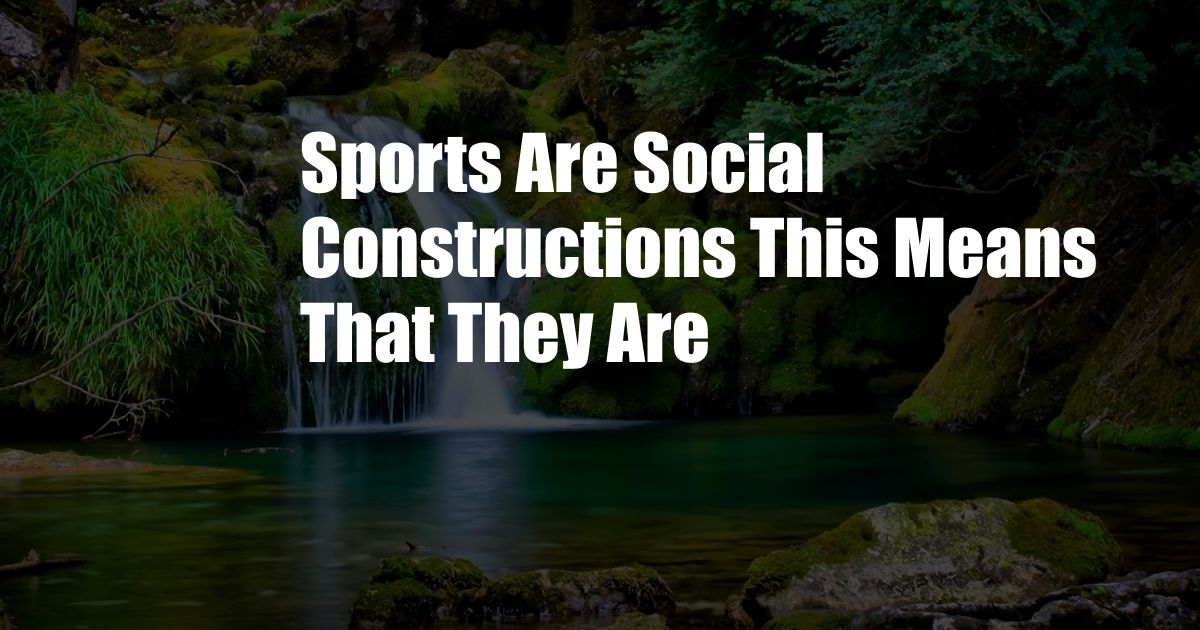
Sports: Social Constructions and Societal Reflections
As an avid sports enthusiast, I’ve always been fascinated by their profound impact on human culture. From ancient Greek competitions to modern-day football matches, sports have shaped our societies, serving as a vehicle for entertainment, social cohesion, and even national identity. However, what if I told you that sports are not natural phenomena but rather social constructions that we have created?
The Nature of Social Constructions
Social constructions refer to ideas, values, or practices that are not inherent or fixed but instead are shaped by human interactions and social norms. Sports fall precisely within this category. They are not something that exists independently of our society but rather have been invented and developed through our collective actions and beliefs. This means that different cultures and historical contexts can give rise to vastly different sporting practices.
Evolution of Sports: A Mirror of Society
The history of sports is intricately intertwined with the evolution of human societies. In ancient Greece, for example, athleticism was closely associated with military prowess and civic virtue. The Olympic Games, first held in 776 BC, were both a celebration of physical excellence and a display of the city-state’s cultural and political power.
As civilizations progressed, sports continued to reflect the changing values and priorities of society. In the Victorian era, for instance, sports became increasingly formalized and organized, reflecting the rise of industrialization and the importance of efficiency and competition. Today, sports have become a global phenomenon, driven by media consumption, commercialization, and the quest for entertainment.
Understanding the Social Significance of Sports
The social construction of sports has profound implications for our understanding of their significance. By viewing sports as cultural artifacts, we can better appreciate their role in:
- Social Cohesion: Sports can foster a sense of community and belonging by bringing people together to cheer for a common cause or share in the excitement of competition.
- Identity Formation: Sports can provide individuals and groups with a sense of identity, whether it be based on nationality, ethnicity, or social class.
- Social Commentary: Sports can be used as a vehicle for social criticism or to promote social change. For example, the Black Lives Matter protests during the 2020 NFL season highlighted the ongoing struggle for racial justice in the United States.
- Economic Impact: Sports have a significant economic impact, generating revenue through ticket sales, sponsorships, and merchandise sales.
Expert Advice for Navigating the Social Landscape of Sports
As a blogger who has covered sports extensively, I’ve witnessed firsthand the power of sports to both unite and divide people. To navigate the complex social landscape of sports, it’s essential to:
- Be Aware of Cultural Biases: Recognize that sports are shaped by cultural norms and values, which can differ significantly across societies.
- Promote Respect and Inclusivity: Remember that sports should be enjoyed by all, regardless of their background or abilities.
- Use Sports as a Force for Good: Encourage the use of sports to promote social justice, community involvement, and positive role models for youth.
FAQ on the Social Construction of Sports
Q: What does it mean for sports to be social constructions?
A: It means that sports are not naturally occurring phenomena but rather are created and shaped by humans through social interactions and norms.
Q: How do sports reflect the values of a society?
A: The types of sports that are popular, the rules they follow, and the way they are played can all provide insights into the values and priorities of a given society.
Q: Can sports have a negative social impact?
A: While sports can generally foster positive social outcomes, they can also perpetuate negative stereotypes, promote unhealthy competition, and be used as a form of political propaganda.
Conclusion: Sports as a Mirror to Society
Sports are undoubtedly a powerful force in our societies, but their meaning and significance are not fixed but rather are constantly evolving and being shaped by our collective actions and beliefs. By understanding the social construction of sports, we can better appreciate their multifaceted role in human culture, both as a source of entertainment and as a reflection of our shared values and aspirations.
Are you interested in the social construction of sports? Share your thoughts in the comments below.